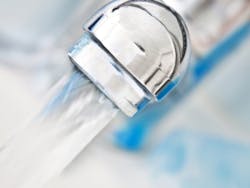Revised Regulations
About the author: Amy Reichel is marketing and communications specialist for the Water Quality Assn. Reichel can be reached at [email protected].
The case for sustainable products and processes is becoming more and more apparent. From sourcing more sustainable raw materials, to finding new ways to limit the environmental impacts of production, manufacturers are expanding their offerings in the sustainable marketplace as the environment continues to move to the forefront of public and media attention.
However, sustainability is about more than generating positive press. Sustainability is a growing area of certification because most sustainability initiatives actually produce a positive return on investment over time, beyond just increasing sales revenue. This is due to the fact that, in practice, sustainability is largely about reducing waste and improving efficiency. Therefore, these efforts usually result in longer-term cost savings in areas such as manufacturing productivity, raw materials, waste disposal and regulatory compliance risk.
The Water Quality Assn’s. (WQA) Sustainability Certification Program allows retailers and consumers to verify that a product has been manufactured according to industry standards for recognized best practices in environmental sustainability and corporate social responsibility. The two primary standards available for certification are WQA/ASPE/ANSI S-802 and WQA/ASPE/ANSI S-803.
WQA/ASPE/ANSI S-802
WQA/ASPE/ANSI S-802: Sustainable Water Treatment Media is a business-to-business American National Standard that focuses on the sustainability of the two most common treatment media used in water filter systems: activated carbon and ion exchange resin. S-802 is a complementary standard to WQA/ASPE/ASNI S-803: Sustainable Drinking Water Treatment Systems. Manufacturers interested in certifying to S-803 drinking water treatment unit (DWTU) systems that utilize either (or both) of these media types are awarded maximum credit if the media is certified to S-802. Certification to this standard helps a company establish market preferability with customers interested in purchasing more environmentally friendly treatment media for use in their DWTU systems.
WQA/ASPE/ANSI S-803
WQA/ASPE/ANSI S-803 is an American National Standard that includes drinking water filter products that utilize activated carbon, ultraviolet systems, dispensers and fountains, cation exchange softeners, and other treatment systems that utilize ion exchange resins. Activated carbon systems and systems that utilize ion exchange resins get maximum credit towards conformance with this standard if that treatment media is certified to
S-802. S-802 and S-803 help manufacturers establish market leadership by certifying product sustainability via a program of monitoring and improvement throughout all phases of the product life cycle. They evaluate the sustainability of these products based on core attributes common to all products types (product design, health and safety, emission and consumptions, supplier engagement, and end-of-life management), as well as product type specific requirements based on the specific environmental impacts of the particular product category.
Why Revise the Standards?
It is not uncommon for standards to be revised and for criteria to be changed or added in order to continue to meet the needs of the marketplace. S-802 has been revised to expand the scope to include ion exchange resins. S-803 has been revised to expand the scope to include cation water softeners and other products that utilize ion exchange resins, such as pour-through pitchers and inline filters. Below are some of the specific types of criteria included in the new versions of the standards so that the newly expanded scope can be properly evaluated for environmental performance.
S-802 new criteria for ion exchange resin include:
- Certification of ion exchange resins manufacturing facilities to a choice among existing chemical production industry or trade association management standards, including: OSHAS 18001; National Association of Chemical Distributors (NACD) – Responsible Distribution; ISO 14001; American Chemistry Council (ACC) – Responsible Care Management Systems (RCMS); and ACC – Responsible Care 14001 (combines the requirements of the previous two standards);
- Certification of the manufacturer’s raw chemical suppliers to any of the above standards;
- Reducing the impact of solvents in resin production; and
- Controlling residual contaminants in the finished product.
S-803 new criteria include the following for:
Products that utilize ion exchange resins:
- Certification of ion exchange resin supplier manufacturing facilities to a choice from among existing chemical production industry/trade association management standards: OSHAS 18001; NACD – Responsible Distribution; ISO 14001; ACC – RCMS; and ACC – Responsible Care 14001 (combines the requirements of the previous two standards).
Cation softener efficiency:
- Better system sizing recommendations for improved efficiency of regeneration and lower operating costs;
- Salt and water efficiency in regeneration;
- More efficient regeneration scheduling frequency;
- Reserve capacity fine-tuning;
- Proportional brining/regeneration; and
- Total elimination of salt discharge.
Rising populations in hard water areas and droughts are making chloride discharge a larger issue because of the difficulty of removing it at the wastewater treatment plant. In extreme cases, communities or jurisdictions have even imposed softener bans. Consumers in these impacted areas are more likely to seek out softeners that are more efficient and that can decrease chloride discharge levels.
The new edition of S-803 addresses these concerns with its criteria that provides assurance to both consumers and regulators that the water treatment industry is contributing their part to offer practical solutions to this problem. It also has been apparent in the past few years that the most effective measure to prevent mandatory government imposed regulations is for our industry to demonstrate that it is effectively policing itself through voluntary certification programs.
